|
Kizukuri |
|
Karuko Archaeological Hall
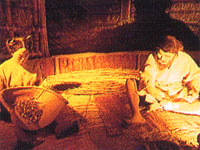 |
Located next to City Hall, Karuko houses a wide array of
archaeological finds dating back to Japan’s ancient Jomon Period. The
artifacts were unearthed at the nearby Kamegaoka archaeological site,
and a full-scale replica of a traditional Jomon dwelling is also on
display.
Click
here for more information (page displays in Japanese) |
Buried Forest
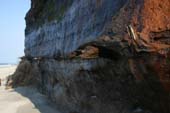 |
One
of the world’s largest buried forests lies along a half-mile stretch
of the Dekishima coastline and dates back nearly 30,000 years to the
late ice age. Visitors can examine the root system of an ancient
coniferous forest which as been preserved in a foot tall layer of peat
along the shoreline. |
Bense Marsh
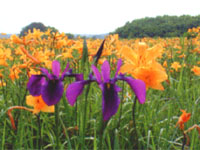 |
The
23 acre Bense Marsh is a low-moor marsh selected as one of Japan’s Top
100 Natural Spots. In early June, day lilies paint the area a
brilliant yellow. In the beginning of July, Japanese iris dyes the
fields a vibrant purple. |
Dekishima
Ocean Swimming Area
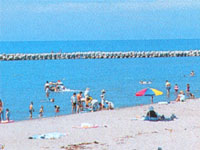 |
Similar to Magua Beach
in Shariki, Dekishima is a great place to enjoy swimming
in the Sea of Japan. Kizukuri fishing port and the buried forest are
also nearby. |
|
|
Shariki |
|
Takayama Inari Shrine
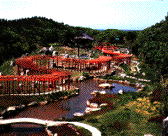 |
Takayama Inari Shrine is located in Shariki and is one of the most
famous Shinto shrines in all of northern Japan. Although it is
unclear when the shrine was founded, it is believed that travelers
began enshrining their guardian deities here as early as the 10th
century. The shrine is famous for its spectacular row of red torii
gates, similar to the ones found at the Fushimi Inari Shrine in Kyoto. |
Magua
Beach Park
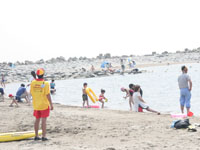 |
Located on the southern end of Shariki’s Fishing Port, Magua Beach
Park is the site of the annual Cheseborough Cup Swim Marathon, and is
a popular swimming beach throughout the summer. |
|
|
Kashiwa |
|
Japan’s Oldest Apple Tree
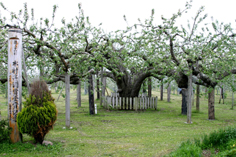 |
Planted in 1878, Japan’s oldest apple tree can be found in the Kashiwa
area of Tsugaru City. The tree is nearly 25 feet tall and still
produces over 7,000 apples every year. It has also been designated as
a Natural Cultural Treasure by Aomori Prefecture. |
|
|
Inagaki |
|
Inaho-ikoi Historical Village
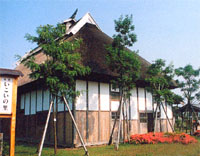 |
One
of the most popular places to visit in Inagaki is the Inaho-ikoi
Historical Village. A full scale restoration of a 100 year-old
Japanese house as well as wara (rice straw) weaving classes
give visitors a sense of what life was like in farming villages
hundreds of years ago. |
|
|
Morita |
|
Tsugaru Earth Village
Earth
Village is a recreation and lodging facility located in the Morita
area of Tsugaru City. Activities include tennis, basketball, putter
golf, bike riding, cookouts, and much more. Lodging is available at
both campsites and a Japanese-style hotel.
Click
here for more information (page displays in Japanese)
|
|
Throughout the City |
|
Makeup Jizo
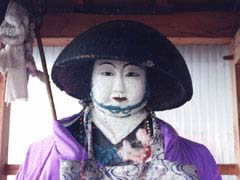 |
In a
tradition borrowed from Kyoto, many of the jizo statues
throughout the city are adorned with clothing and makeup. In the
Buddhist faith, jizo is a Buddhist bodhisattva believed to be
the guardian deity of children, and in this area many people mourn the
passing of a young child by erecting a statue of jizo.
Traditionally, the statues are redecorated around the end of July
every year on the date that corresponds to June
24th
on the lunar calendar. |
|
|
Home
Tsugaru City Info
Sightseeing Information
Things to See
Events
Places to Stay
Exchange Program
Sister City: Bath, Maine
International Events
Coordinator for
International Relations
Message Board
Links
|








